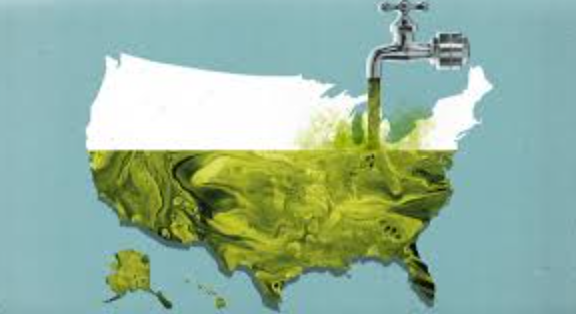Flowing for some but dry for others: America’s secret water crisis
When people imagine America, they picture beautiful skyscrapers that tower over cities, Supermarkets with unlimited stock, and a myth of endless opportunities. The U.S. is the world’s wealthiest nation, but around 2 million Americans don’t have running water at all, while 46 million lack access to safe drinking water. While many Americans talk about other countries not being able to provide clean water for their citizens, the same problem is happening in America, not just in war-torn countries but right in our own neighorhoods. This crisis is not talked about enough, with many people not seeing this problem in their day-to-day lives in America. Cities like Jackson, Mississippi, Rio Grande, TX, Flint, Michigan suffer, but since this affects poor, Black, Latino, and indigenous communities, politicians and the media treat water access as an invisible problem.
With 13% of Americans around the country is a big problem. According to the CDC foundation, “Many of the Americans who don’t have access are people who are in Latino, Black, and Indigenous communities are much more likely to experience poor water and sanitation systems. Immigrants and people living in low-income and rural areas are also disproportionately affected.” A main reason that these areas suffer with water accessibility is due to aging infrastructure and lack of funding to be able to build new water pipes. According to the Dig Deep website the U.S. should, “Appropriate dedicated funds via Congress to close the water gap over the next 10 years. New and existing federal funding should be designated for technological innovation and system operation, and maintenance. The up-front investment required for new infrastructure is about $18.4 billion, less than Americans spend every year on ice cream.” The water crisis can be solved, but it is not worth it in the eyes of the government. In cities flush with tax dollars from the wealthy residents who enjoy their reliable pipes, minorities suffer from degrading pipes and worry if the water will ever be safe for them to drink.
Most parts of the country that suffer from reduced access to water are rural areas where rich people don’t really live. Also, according to the U.S. Department of Rural Development, “These challenges are increasing due to rising water costs, aging infrastructure, depleted water supplies, climate change, and regulatory failures.” Many places in the U.S. have rich people who pay a lot of taxes, which creates funding that goes into the city. The city uses this money to build roads, water infrastructure, and for rural areas where rich people don’t live. It is hard for them to provide proper funding for the city to afford the necessities. But you may be asking, what is the government doing if they’re not solving this issue? The government funds wars overseas using about 100 billion on foreign aid support, and according to many sources, the amount to fix the water crisis costs far less than the amount of foreign aid funding. It bothers me that my country’s government would rather support and dump millions of dollars on overseas wars that are mostly killing innocent people and are only sometimes fought for good reasons. I truly believe that America could put aside $18.4 billion to fix our water access crisis. We are told that there is no money, that we are busy with national defense, even though the list of wars that America involves itself in is mostly shadow wars. According to the KX news, America is involved in 15 shadow wars as of 2023.
When seeing how many rural areas don’t have clean water, it upsets me because this is supposed to be the land of opportunities, but instead many people go without water in the wealthiest nation in the world. This map shows that many people across the country, not just one area, struggle with accessibility to clean water. In America, it seems that your zip code determines whether you are treated as a citizen or collateral damage. Your zip code should not determine whether you have clean water. This goes to show how water accessibility is not just an area problem and that it can be resolved if the government steps up and pays for cities’ new water infrastructure, and stops treating people like 2nd-hand citizens. Without access to clean water, you can’t do many things, including drinking tap water, cleaning your fruits and vegetables, basic hygiene, and also the spread of diseases. There is no good reason that a mother in Jackson, Mississippi, has to boil water before giving it to her kid.
The struggle of not having access to clean water is something I thankfully have not had to deal with. When you go and grab a cup and drink some tap water, and you’re able to shower freely, just remember 2.2 million people wish they could do that. A lot of people are not able to do this basic health necessity just because they live in a poor rural area. I think everyone should have access to clean water, not just in America, but all over the world. Access to clean water is a human right.





